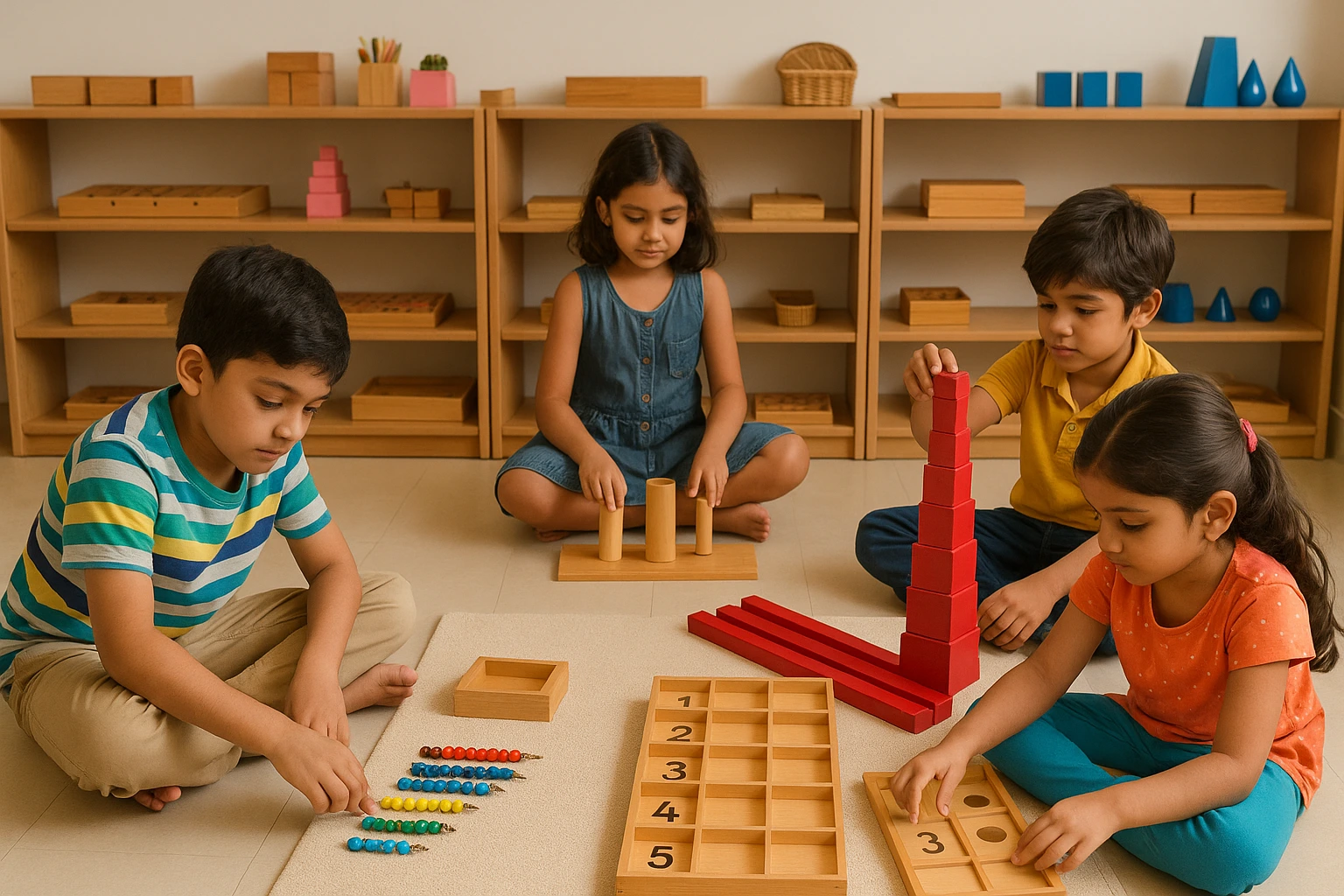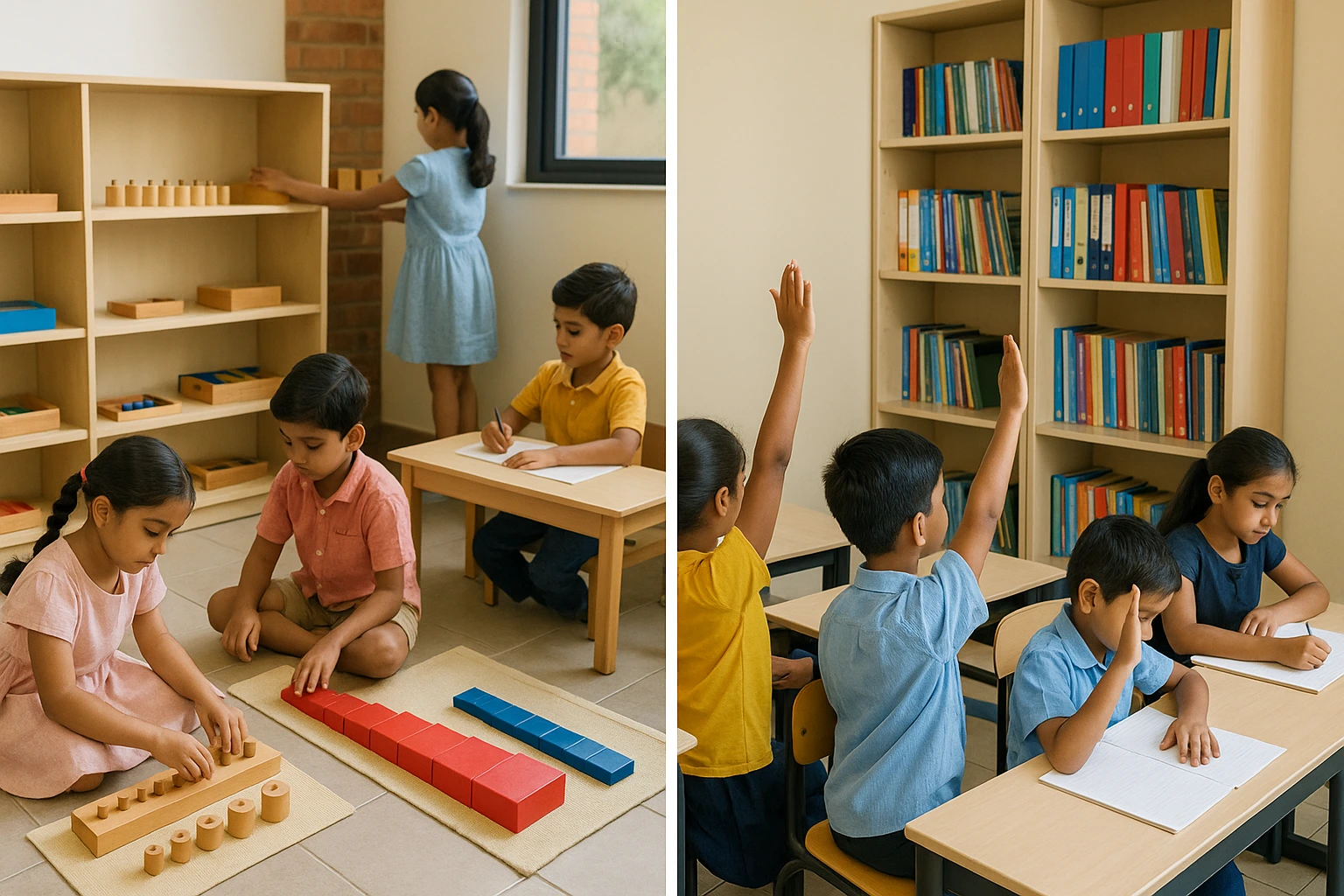
Maria Montessori Childhood Method is an innovative approach that supports early childhood development with Montessori Teacher Training Course a different perspective. It believes children are capable of self-directed learning and promotes independence by providing structured activities to support children’s curiosity/interest in discovering the world
The Montessori Method fosters every area of development with an inspiring learning environment for young learners. It respects children’s natural curiosity, encourages them to discover and learn without being forced.
The Montessori Childhood Method is a popular teaching approach all around the world with a significant impact on creating balanced personalities in children.
What is the Montessori Method?
The Montessori Method of education is self-directed and independent learning, where children are motivated to choose activities and explore the environment. It uses Montessori materials and tools to prepare the classroom and support the complete development of children. The impact of Montessori Education on the early years of children is incredible, helping them transition into balanced and successful adults.
To download brochure of MTTC Course, Click Here!
For more details of MTTC Course, Call/Whatsapp on +919869546913 / +919869866277
Here are some crucial principles that the Montessori Method follows:
Child-Centered Approach:
This approach has a major focus on supporting the child’s needs and curiosity. It offers a learning space that provides freedom of choosing activities of children and fosters their development.
Diverse-Age Groups:
In a Montessori Classroom, children of different ages learn and grow together. This develops kindness, empathy, understanding, and social interaction among children.
Montessori Materials:
Classroom Materials used in Montessori Teaching support cognitive functioning, physical movements, and life skills.
Classroom Environment is Prepared Differently:
The classroom set-up of the Montessori Method is prepared to promote exploration, self-learning, and independence.
The Montessori Method allows children to choose activities that appeal to them. Educators are directors of children in the Montessori method; they guide children through activities and observe their progression.
How Montessori Supports Early Childhood Development?
Montessori supports Early Childhood Development with its open-ended and real-life activity learning approach. With major emphasis on self-directed learning, it targets crucial development areas like fine/gross motor development, cognitive enhancement, skill development, and stronger physicality.
Motor Skills Development
- Strengthen muscles with structured activities.
- Improves sense with sensorial materials.
- Movement-friendly Classroom helps muscle development.
Emotional & Social Growth
- Group Activities support teamwork, kindness, and trust.
- Working with children of different ages helps to develop social interaction with peers.
- Children learn Empathy, Mutual Respect & Collaboration.
Language Development
- Language-Rich Environment
- Phonetic Learning Materials
- Conversation and Listening
Cognitive Development
- Self-Directed Exploration
- Concrete to Abstract Learning
- Logical Sequencing and Order
Early development of young students has an evident impression of Montessori Education, which allows children to explore their potential and become decision-makers. Join the Montessori Teacher Training Course and understand its influence and significance on the early growth of children.

Source: istockphoto
Benefits of the Montessori Method in Early Years
The Montessori Method was developed with a vision to foster child-centered learning, where children are the main protagonists in choosing their learning activities. This primarily benefits the independence, confidence, creativity, and social well-being of children.
Here are some core benefits of the Montessori Method in the Early years:
Improved Attentiveness
- Montessori activities are designed to ignite curiosity and improve concentration in finishing the activity on a positive note.
- When children are interested in the learning environment, distractions are eliminated, leading to a productive growing space.
Increased Independence & Confidence
- Montessori education greatly supports the individuality of children by making them confident in learning.
- The Montessorians encourage children to make small decisions regarding their activities.
Love for Learning
- The prepared environment offers materials that match the child’s developmental needs and support intrinsic.
- It encourages curiosity to learn and allows children to follow their interests.
- Self-paced learning, students are forced to complete activities in a hurry. Instead, they take time and enjoy the process.
Emotional Understanding
- Under Montessori Teaching, children learn to regulate their emotions and behave in an organized way.
- It develops empathy and understanding through Group learning involving children of different ages.
- Montessori Classroom, children develop patience, self-regulation, and a sense of responsibility.
The Montessori Childhood Method works beyond academic learning; it supports the individuality of each child. And help them develop independence, logical reasoning, freedom of decision emotional stability.

Montessori Vs Traditional Education
Montessori and Traditional Education both aim to support the inclusive development of young children. In traditional teaching, children follow the instructions of teachers and focus on academic learning. While Montessori Education promotes self-directed and child-centered learning. It focuses on enhancing the individuality of a child by making them independent learners.
Let’s explore the areas where Montessori differs from Traditional Education:
Teaching Style:
Montessori Education
- Children are guided by Montessori Teachers to choose and do activities on their own.
- Emphasis on hands-on materials and self-correction.
- Montessori Teaching allows children to explore learning following their interests.
Traditional Education
- Teacher-led instruction focused on standardized lessons.
- Regardless of individual learning speed, the traditional education class works on an undeviating pace.
- Rote Memorization & heavy reliance on textbooks.
Classroom Setup:
Montessori Classroom
- Minimal furniture with open space for movement and floor work.
- Materials are designed to be child-friendly and easily accessible.
- The Prepared environment supports developing social and life skills in children.
Traditional Classroom
- Rows of desks facing the teacher or board.
- Students were grouped by age, with less interaction across age levels.
- Materials kept out of reach, requiring teacher permission for use.
Child Outcomes:
Montessori Approach.
- Promotes confidence and independence with emotional well-being.
- Encourages a love for learning and motivates to do better.
- Develops critical thinking, problem-solving skills, and intelligence.
Traditional Education
- Prepares children’s academic practices and uniform assessments.
- Focus on external rewards and discipline-based motivation
- Limited flexibility for individual strengths and interests.
The Montessori Teacher Training Course by Vidhyanidhi Education Society (Govt. Regd.) is the finest program to pursue; it has been designed with an advanced layer of curriculum.
“Let Vidhyanidhi Education Society’s MTTC Course help you achieve your dream!”
To download brochure of MTTC Course, Click Here!
For more details of MTTC Course, Call/Whatsapp on +919869546913 / +919869866277
FAQs
Are Montessori Students More Successful than Traditionally Schooled Students?
Montessori students become independent learners from a young age, which helps them master any skills and academics easily without help.
Is Montessori Effective for Children with Special Needs?
Montessori has a great effect on children with special needs, because it gives them space to learn at their own pace.
How Does the Montessori Method Support Early Childhood Development?
The Montessori Childhood Method supports early development through freedom of learning and exploring the world based on children's natural curiosity.



